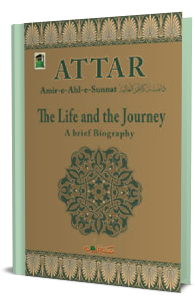
The Amir of Ahl al-Sunna – his life and story
The Amir of Ahl al-Sunna’s career and integrity
Mawlana Muhammad Safdar Attari Madani
Earning halal sustenance (rizq) is the way of the prophets عَـلَـيْـهِمُ الـصَّلٰوةُ وَالـسَّـلَام and our pious elders. The Prophet Muhammad صَلَّى الـلّٰـهُ عَلَيْهِ وَاٰلِهٖ وَسَلَّم did this via business. He also commanded his Umma to earn halal sustenance, as evidenced by this hadith: “Seeking halal sustenance is an obligation after the fulfilment of ˹other˺ obligations.”[1]
In terms of his working career and across other spheres of his life, Mawlana Ilyas Attar al-Qadiri دَامَـتْ بَـرَكَـاتُـهُـمُ الْـعَـالِـيَـهْ stands as a fantastic example of uprightness and integrity. His experiences can teach us a great amount.
Integrity in business
Honesty in business is essential. Unfortunately, businessmen today lie, deceive, and deliberately sell faulty items. The Amir of Ahl al-Sunna was the antithesis of this. During a Madani Muzakara, he said:
I used to fill bottles with coconut oil and sell them. This oil came from a country in which coconuts grew abundantly. It was known for being pure and high in quality. The shopkeeper I would buy in wholesale from was a bearded Sunni man of impeccable character. He loved the Prophet greatly. I developed good rapport with him.
I once asked him if this oil was 100% pure and had nothing mixed in. He then showed me a document which came with the oil when imported. It said, “Two percent of this contains extracts, included to maintain the oil’s quality and consistency.”
From that moment onwards, I told customers the oil had x amount of extract within it. I feared if I said it was pure, I may be punished for this in the Hereafter, as it was not 100% pure. If you do this with customers, they will not stop buying, but instead buy two even if they only needed one. They will consider your business to be doing well, for you to say something like this.
Some think telling the truth drives customers away, or this is not a time in which we can be honest. These are baseless statements. Truth was spoken before and now. It will continue to be spoken in the future. The era of honesty does not end, and truthful people will not disappear. If we become truthful, our lives, communities, and businesses will flourish اِنْ شَــآءَالـلّٰـه.”[2]
Striving in work and salah
The Amir of Ahl al-Sunna once worked in a factory and transported goods on his bicycle to supply locations. He was also imam of Karachi’s Noor Masjid. He would leave work a few minutes early to reach said masjid on time and lead the salah.[3]
Separate clothing for salah
We also see his consideration for offering salah on time even at work and the immense decorum he displayed towards this esteemed act of worship. He recalls:
I had separate clothes for work. Once I finished, I would change into a fresh new set for salah. I did this because my work clothes would become dusty and smudged, and it is makrūh tanzīhī (disliked) to pray in such clothing. When we visit a respected individual of this world, think about the extent we go to ensuring our clothes are clean and presentable.
Then, imagine what kind of clothing we should wear when we stand before Allah. You can get an idea of this yourself. Wear clean clothes, apply fragrance, and stand before Allah with utmost respect.[4]
Perfume business and becoming “Attar”
The Amir of Ahl al-Sunna owned a perfume (ʿiṭr) business. This led to him utilising the pen name “Attar.” [5]
Decorum for relics during work
During the days of his perfume business, someone gave him the idea of selling incense sticks. He started this business with the name “Qadiri Incense Sticks”, and he printed packets with this upon it. He says:
One day, I saw a Qadiri Incense Sticks packet on the floor and was struck with fear. I thought, “What if Shaykh ꜤAbd al-Qādir al-Jīlānī رَحْمَةُ الـلّٰـهِ عَـلَيْه becomes angry with me and says I disrespected his name to promote my business? What would I say to him? After that, I decided to change the name of the brand to “Qawmi Incense Sticks”.”[6]
This is a lesson for businessmen to not have holy names or images on their products, shops, and packaging. It is better to have a unique symbol as this carries no risk of disrespect. Avoid using holy names if one is required to. Good fortune is from respect. Misfortune is from disrespect.






Comments